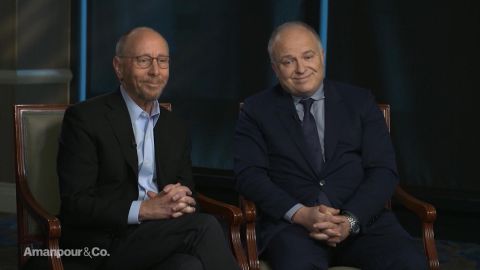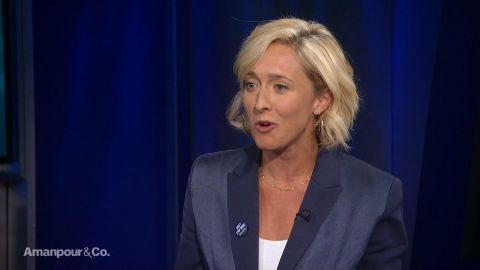Read Transcript EXPAND
KATE PAKENHAM, PRODUCER, “EMILIA”: In the 1970s, a historian called A.L. Rowse connected Emilia Bassano to Shakespeare, and decided she was the dark lady of his sonnets. And so this woman whose poetry had only been existing — only specialists knew about her poetry — suddenly hit the headlines in the 1970s because she was connected to this famous man…
CHRISTIANE AMANPOUR: William Shakespeare.
PAKENHAM: William Shakespeare, as the dark lady.
AMANPOUR: And do we think that’s true? I mean, I saw the play last night. I mean, it is a real rollicking show and it’s really interesting and has so many parallels with life today, which we’ll get into. But do you come down on her being the dark lady? Because others say it’s a mistranslation of a word.
PAKENHAM: I’m — I’m — I’m absolutely convinced. I personally — I’m claiming the dark lady for Emilia. But, of course, there are a lot of people who it could have been and I think in a way, that’s the fun of this play. It can’t be a pure history play. It’s a — in a sense, it’s a memory play because, of course, history hasn’t been written from the point of view of women. That’s really the point of it. So Morgan Lloyd Malcolm, the writer and the Nicole Charles, the director, took the pieces of information they could find about Emilia and then imagined her story, and that’s the joy of it is, a group of — it’s an all-female creative team led by Morgan and Nicole, who have — sort of pulling Emilia across the centuries and making her our own now.
AMANPOUR: And you just alluded to when it was first produced and even now, it’s an all-female cast. So you’re kind of flipping this historical, sort of fetish at the time, when even women were played by men. Now men are played by women and women played by women in this performance. It’s pretty remarkable in that way.
PAKENHAM: And fun, I think. The kind of to see Jackie Clune playing Lord Henry Carey, I mean, it’s just — its hilarious and its fun. And I think that wasn’t originally, when Morgan set out to write it, that wasn’t originally the plan, but she realized there were all of these — important men like Shakespeare, like the Lord Chamberlain who were going to need to have airtime in this play and she suddenly realized that the stage would again, taken up by men. And so the way of dealing was, let’s make them all women. And I think you can have a lot of fun with that.
AMANPOUR: Not only a lot of fun, but it’s also quite remarkable, her story. Because Emilia was this young girl. Her father, family were musicians appointed to the court. Her dad died when she was quite young and she was sort of taken by the countess or duchess of Kent, who gave her a good education, right? And that in itself was a rarity.
PAKENHAM: Amazing. I mean, she was incredibly lucky in a sense. She was — as you say, her dad died when she was 7 and her mum died when she was 18, but Susan Bertie looked after her and educated her.
AMANPOUR: …who is the countess.
PAKENHAM: …who is the countess of Kent, yes. She had this remarkable luck.
About This Episode EXPAND
Christiane Amanpour speaks with George Packer about the legendary diplomat Richard Holbrooke; and Kate Pakenham about her new play, “Emilia.” Hari Sreenivasan speaks with Andrew Scott & Paul Irving about aging in today’s society.
LEARN MORE


